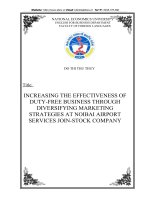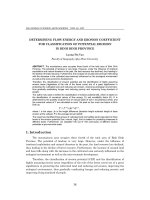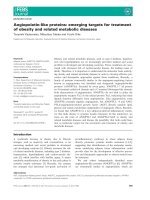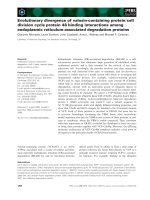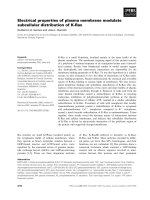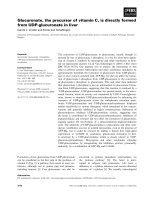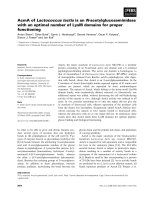autism nonverbal forms of communication autism nonverbal forms of communication presentation by stefanie tony lisa table of contents what is autism different types of autism the research focus chil
Bạn đang xem bản rút gọn của tài liệu. Xem và tải ngay bản đầy đủ của tài liệu tại đây (329.63 KB, 16 trang )
<span class='text_page_counter'>(1)</span><div class='page_container' data-page=1>
Autism: Nonverbal forms
of communication
</div>
<span class='text_page_counter'>(2)</span><div class='page_container' data-page=2>
Table of Contents:
What is Autism?
Different types of Autism
The Research Focus
Children with Autism:Verbal Communication
Our Research and it’s Importance
Effective Methods
– American Sign Language
</div>
<span class='text_page_counter'>(3)</span><div class='page_container' data-page=3>
What is Autism?
A psychiatric disorder of childhood
characterized by marked deficits in
communication and social interaction,
preoccupation with fantasy, language
</div>
<span class='text_page_counter'>(4)</span><div class='page_container' data-page=4>
Different types of Autism
Childhood Autism
Asperger’s syndrome
Childhood disintegrative disorder
Rett’s Disease
</div>
<span class='text_page_counter'>(5)</span><div class='page_container' data-page=5>
The Research Focus:
Communication of Autistic
</div>
<span class='text_page_counter'>(6)</span><div class='page_container' data-page=6>
Children with Autism: Often Have
Children with Autism: Often Have
Trouble Communicating Verbally
Trouble Communicating Verbally
Autistic children are unable to communicate
their wants, needs and desires effectively so
that people can understand them
It is important for a child with autism to be
</div>
<span class='text_page_counter'>(7)</span><div class='page_container' data-page=7>
The Research:
The Research:
We looked at different forms of
nonverbal communication that children
with autism can use.
We wanted to discover effective ways to
</div>
<span class='text_page_counter'>(8)</span><div class='page_container' data-page=8>
It’s Important:
It is important for a child with autism to
be able to communicate with others in a
way that will effectively convey what
they want to say.
This is important not only in a school
</div>
<span class='text_page_counter'>(9)</span><div class='page_container' data-page=9>
Effective Methods:
American Sign Language
Picture Exchange Communication System
(PECS)
Message boards
Voice Output Communication Devices
</div>
<span class='text_page_counter'>(10)</span><div class='page_container' data-page=10>
American Sign Language
Sign language was first developed as a means of
communication for hearing-impaired individuals.
Sign language has also been used to teach people with
developmental disabilities who have little or no communication
skills and has been proven to be successful.
Teaching autistic children how to use sign language is not as
</div>
<span class='text_page_counter'>(11)</span><div class='page_container' data-page=11>
Picture Exchange Communication System Exchange Communication System
(PECS)
(PECS)
Many children with autism tend to learn visually.
Many children with autism communicate using picture
cards.
PECS:
– Decrease negative behaviors that were caused by
frustrations;
</div>
<span class='text_page_counter'>(12)</span><div class='page_container' data-page=12>
PECS Phases
Phase 1: Teacher and Student Card Motivation Tool
Phase 2: Student Independence
Phase 3: Multiple Pictures
</div>
<span class='text_page_counter'>(13)</span><div class='page_container' data-page=13>
Message Boards
Message Boards are set up in the
classroom to tell an autism child what
they are going to be doing for the day.
The child would go the board after each
</div>
<span class='text_page_counter'>(14)</span><div class='page_container' data-page=14>
Voice
Voice Output
Communication Devices
Communication Devices
A Voice Output Communication Aid or VOCA is an
electrical communication device which assists people
who have a communication impairment to express
their needs, exchange information, ask questions and
participate in conversations.
A voice output device is an electronic device that
"speaks" for a child
The child can expressively communicate one or more
messages.
</div>
<span class='text_page_counter'>(15)</span><div class='page_container' data-page=15>
Our Results
There was no one method that seemed
to work more effectively than another.
The method used depends on the child.
What might work for one child may not
</div>
<span class='text_page_counter'>(16)</span><div class='page_container' data-page=16>
References
Bishop, Dorthy. (2005). Executive functions in children with communication.
Impairments, in Relation to Autistic Symptomatology. 2: Response Inhibition
<i>Autism the International Journal of Research and Practice,</i> 9(1), 29-35.
Bondy, A. S. and L. Frost. (2002). The Picture exchange communication system.
<i>Focus on Autistic Behavior</i> 9(3), 1-19.
Kravits, T. R. (2002). Brief report: Increasing communication skills for an
elementary- aged student with autism using the picture exchange communication
system. <i>Journal of Autism and Development Disorders</i>, <i>32</i>(3), 225-230.
Shore, S. M. (2002). The language of music: Working with children on the
</div>
<!--links-->
Báo cáo y học: "Different effect of exercise on left ventricular diastolic time and interventricular dyssynchrony in heart failure patients with and without left bundle branch block"
- 8
- 868
- 1
